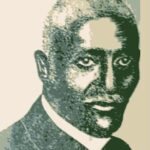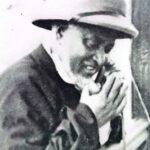YESHAQ
- 3 Min Read
Yeshaq (?-December 21, 1580) was a loyal servant of Emperors Lebna Dengel [reigned 1508-40] and Galawdéwos [reigned 1540-59], but became a dangerous enemy of his country in the reigns of Emperors Minas (ruled 1559-63) and Sartsa Dengel [reigned 1563-97]. He held the title of Baher Nagash (“King of the Sea,” or ruler of the norther frontier provinces).
Yeshaq was from an important family of Adegana in the Shiré region of eastern Tegré. His father, Ras Dagana, had also occupied the post of Baher Nagash, but during the rebellion of Ahmad in Ibrahim, [Ahmad Grañ], had deserted Lebna Dengel and joined the rebel. Yeshaq, however, remained faithful to Lebna Dengel; and was given his father’s post. After Lebna Dengel’s death in 1540, Yeshaq was one of the few people who loyally served Lebna Dengel’s widow, Empress Sabla Wangel and her son Galawdéwos. In 1541 Yeshaq welcomed Christovão da Gama (leader of the Portuguese military force sent to help the Ethiopian emperor) at Massawa, and, beginning on July 9, accompanied him through much of Tegre.
Yeshaq was in Massawa when the Portuguese fought the two successful engagements of April 1542 with Ahmad Gran, and was also with them during the disastrous battle of Wafla on August 28. The Baher Nagash further distinguished himself some years later in 1558 by successfully preventing the Turks, who a year earlier had landed on the Ethiopian coast, from occupying the highlands. The political career of Yeshaq took a sudden and radical turn in 1560, in the reign of Minas. The emperor was trying to assert his authority over the older and highly influential courtiers and provincial officers. Some of these officials were opposed to Minas’ accession to the throne, and favoured the sons of his elder but deceased brother, Prince Yaegob. Minas therefore began to remove these officers and to replace them with younger and more obedient men.
Many of the nobles, including Yeshaq, therefore came to fear for their positions, and in 1560, under Yeshaq’s leadership, they openly rebelled, proclaiming Tazkara-Qal, the eldest of Yaegob’s sons, as emperor. Defeated by Minas, the rebels then turned for support to the Jesuit missionaries and the Portuguese soldiers, since they were discontented with the way in which the emperor was treating Bishop André de Oviedo, a Spanish Jesuit who had reached Ethiopia in 1557, and who was made Catholic Patriarch by the Pope in 1562. (Minas had viewed Oviedo’s missionary zeal as a threat to internal peace, after which Oviedo openly sided with the rebels.) But Yeshaq soon realised that the Portuguese were not numerous enough to assure him victory, and instead sought the support of the Turks, who welcomed the opportunity to enter the Ethiopian plateau. Turkish muskets helped Yeshaq to defeat Minas in April 1562.
Minas’ death, on February 10, 1563, brought about insincere declarations of loyalty from Yeshaq and his colleagues to Minas’ son and successor, Emperor Sartsa Dengel. But in 1575 Yeshaq once more allied himself with the Turks, allowing them the following year to build fortifications at Dabarwa, 22 mi (36 km) south of Asmara. He further persuaded Muhammad ibn Nasir, king of Adal from 1571-77, to join him in rebellion. Muhammad’s uprising of 1577 was crushed, and the turn of Yeshaq and his Turkish allies came in 1580. Yeshaq was killed in battle on December 21, 1580, and was buried at Addi Yaqworo, scene of the fighting. After his death the emperor greatly reduced the territories ruled by successors to the title of Baher Nagash.
MERID WOLDE AREGAY




